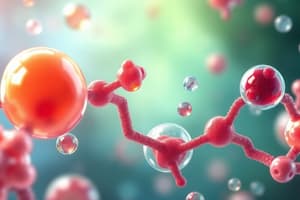Podcast
Questions and Answers
What are monosaccharides? Give examples.
What are monosaccharides? Give examples.
- Lactose and sucrose
- Glucose and ribose (correct)
- Starch and glycogen
- Cellulose and chitin
What are disaccharides? Give examples.
What are disaccharides? Give examples.
- Cellulose and chitin
- Glucose and ribose
- Starch and glycogen
- Lactose, sucrose, and maltose (correct)
What are polysaccharides? Give examples.
What are polysaccharides? Give examples.
- Glucose and ribose
- Lactose, sucrose, and maltose
- Starch, glycogen, cellulose, and chitin (correct)
- None of the above
What is the ratio of carbohydrates?
What is the ratio of carbohydrates?
What is the monomer of carbohydrates?
What is the monomer of carbohydrates?
What is a polymer in carbohydrates?
What is a polymer in carbohydrates?
How are carbohydrates made?
How are carbohydrates made?
How are simple carbohydrates used?
How are simple carbohydrates used?
How are complex carbohydrates used?
How are complex carbohydrates used?
What is the use of starch in complex carbohydrates?
What is the use of starch in complex carbohydrates?
What is the use of glycogen in complex carbohydrates?
What is the use of glycogen in complex carbohydrates?
What is the use of cellulose in complex carbohydrates?
What is the use of cellulose in complex carbohydrates?
What is the use of chitin in complex carbohydrates?
What is the use of chitin in complex carbohydrates?
Humans can break down ____ but not ____.
Humans can break down ____ but not ____.
Flashcards are hidden until you start studying
Study Notes
Monosaccharides
- Simple sugars like glucose and ribose.
- Serve as the primary energy source for cells.
Disaccharides
- Formed by the combination of two monosaccharides.
- Examples include lactose (milk sugar), sucrose (table sugar), and maltose (malt sugar).
Polysaccharides
- Large molecules composed of long chains of monosaccharide units.
- Key examples:
- Starch: energy storage in plants.
- Glycogen: energy storage in animals.
- Cellulose: structural component in plant cell walls.
- Chitin: structural component in fungi and the exoskeleton of insects.
Carbohydrates Ratio
- Composed of carbon, hydrogen, and oxygen in a specific ratio of 1:2:1.
Monomer and Polymer
- Monomer of carbohydrates: monosaccharides.
- Polymer of carbohydrates: polysaccharides.
Formation of Carbohydrates
- Synthesized via condensation reactions, where water is removed to form bonds between monosaccharides.
Utilization of Carbohydrates
- Simple carbohydrates (monosaccharides and disaccharides) are primarily used for quick energy.
- Complex carbohydrates (polysaccharides) serve structural purposes or energy storage.
Specific Uses of Complex Carbohydrates
- Starch: stores energy in plants.
- Glycogen: stores energy in animals; highly branched structure for rapid mobilization.
- Cellulose: provides rigidity and structural support in plant cell walls.
- Chitin: offers structural support in fungal cell walls and insect exoskeletons.
Digestibility of Carbohydrates
- Humans can break down starch but are unable to digest cellulose, which acts as fiber in the diet.
Studying That Suits You
Use AI to generate personalized quizzes and flashcards to suit your learning preferences.



